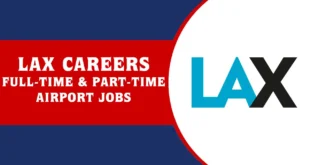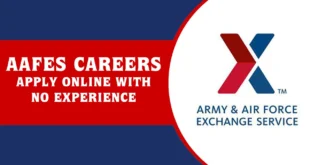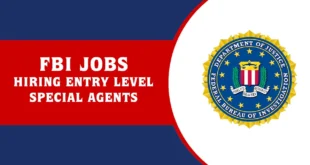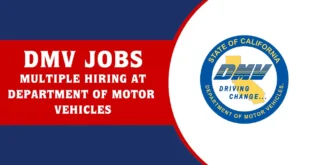Individuals dedicated to public service and making meaningful differences in their communities could be interested in MBTA jobs. If you’re tired of meaningless jobs and want something steady with a purpose, this might be your cup of tea. In this year, public sector employment is seeing a noticeable increase, and jobs with the Massachusetts Bay Transportation Authority are right in the limelight. With rising concerns about economic uncertainty, layoffs in the private tech sector, and the increasing cost of living across cities like Boston and Cambridge, people are looking for stability and security.
While government jobs have always been considered to be reliable, MBTA careers offer a much greater degree of flexibility and variety. From technical roles and administrative positions to customer support and field operations, there’s something for nearly every background. It’s not uncommon to come across listings that offer remote work in areas like IT support, policy planning, or data analysis, especially under their modernization programs. The agency is moving with the times, and it reflects in how they structure their job responsibilities and accommodate changing workplaces. So apply now!
For More Latest Logistics & Transportation Jobs: Click Here
| Company Name: | MBTA |
| Job Locations: | United States |
| Last Updated on: | August 15th, 2025 |
MBTA Careers in United States 2025 | Open Entry-Level Positions
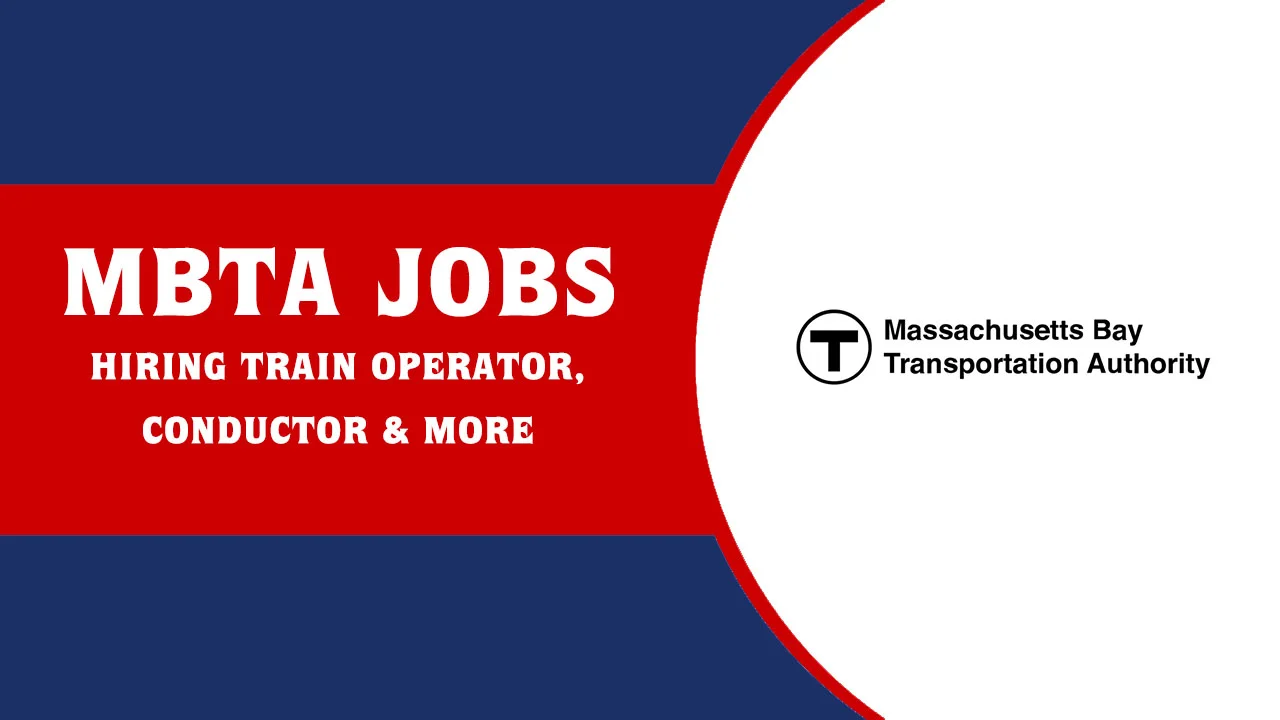
Overview of the MBTA (Massachusetts Bay Transportation Authority)
The Massachusetts Bay Transportation Authority is one of the largest and oldest public transit agencies in the United States. It serves as the lifeline for Greater Boston and its surrounding communities. The agency connects millions of people to workplaces, schools, hospitals, and neighborhoods every single day. Officially created in 1964, it was formed to integrate various transit systems under one central authority. Today, its operations extend far beyond traditional trains and buses.
The agency operates a comprehensive network of subways, ferries, commuter rail, and even paratransit services designed for passengers with disabilities. Every weekday, it provides transportation services to more than 1 million riders across a service area that covers over 175 cities and towns in Massachusetts. The subway system alone is one of the busiest in the country, which handles hundreds of thousands of trips daily across its four main lines. These include the Red, Orange, Blue, and Green.
Work Environment & Culture
Working with the MBTA isn’t just about running schedules or maintaining equipment. It’s about being part of a mission that affects millions of lives across the state. In every operation, employees are at the center, and their working environment reflects that. Whether someone is answering service calls, repairing trains, or developing internal systems, they’re contributing alongside professionals who are committed to serving the public and encouraging team collaboration. Their culture promotes trust, shared goals, and a sense of accountability. Here, the importance of multiculturalism cannot be overstated. People from different ethnic backgrounds, age groups, and educational levels all come together to keep the region’s public transportation running efficiently.
New employees often talk about how MBTA’s onboarding process provides a framework for their experience. From the very beginning, new recruits are enrolled in structured training programs that help them understand not just their individual responsibilities but also how their role fits into the larger system. Mentorships are common in technical positions and field operations, especially for those who join with little to no experience. These programs provide practical learning alongside experienced professionals. It builds confidence and ensures reliable performance even in demanding roles. MBTA is well aware that a strong workforce comes from a well-supported one, and they’ve built a culture that reflects that understanding. Here’s what makes their working environment so special.
- Collaborative Team Culture: Employees work in cross-functional teams where communication is open and solutions are shared.
- Genuine Diversity and Inclusion: Staff members represent a wide range of backgrounds, and the company actively promotes inclusivity through employee resource groups and internal initiatives.
- Ongoing Training Programs: Regular workshops and technical certifications are available to enhance skills and encourage career growth.
- Respect for the Public Service: There’s a shared sense of duty among all employees, motivated by the impact of their work on thousands of lives every day.
Job Fairs and Hiring Events
MBTA is forward-looking in its recruiting strategy and often participates in both physical and virtual job fairs to connect with potential candidates. These events serve as a direct entry point into the organization. They offer attendees a chance to engage with current staff, learn about different job types, and even participate in actual interviews. Job fairs are an important part of the MBTA’s recruitment drive, especially when they need to recruit large numbers of employees for operational roles. Those attending these events often walk away with valuable information about what the company expects. They also learn how it supports employees, and what kind of career growth they can look forward to.
To stay informed about upcoming job fairs, candidates can regularly check the MBTA careers website or follow their updates on LinkedIn. Events are usually posted in advance and are open to the public. These hiring events usually include resume screening stations, individual sessions with department heads, and even preliminary skills evaluations. Applicants are encouraged to bring updated resumes and be ready for basic interview-style conversations. For many, these events become their first real step toward a stable and fulfilling career with the agency.
Types of Jobs Available at MBTA
There are a variety of MBTA jobs available that suit a variety of backgrounds, experience levels, and career interests. Whether someone wants to work with their hands in the field, manage people in an office, or deal with problems behind a computer screen, there’s likely a role that fits. The agency’s workforce is spread across dozens of departments and locations, which creates an environment where career growth is encouraged and internal movement is possible. Some positions require formal qualifications, while others provide field training and are open to those with no experience. There are also select remote roles, especially in the administrative and tech departments, that appeal to professionals looking for flexible work arrangements.
Administrative and HR
Administrative and human resources roles form the operational backbone of the MBTA. These include positions like HR specialists, benefits coordinators, payroll analysts, administrative assistants, and policy researchers. Employees in these roles handle compliance, recruitment, labor relations, and employee services. These jobs typically require strong organizational skills and familiarity with internal systems, and some may offer partial remote work flexibility. For entry-level candidates with good communication skills and attention to detail, administrative roles can provide a great starting point.
Engineering and Maintenance
This category includes civil engineers, electrical technicians, vehicle maintenance crews, and infrastructure specialists. Employees here are responsible for the upkeep of vehicles, tracks, stations, and signal systems. Maintenance teams often work in shifts to ensure uninterrupted operations across all services. These positions are ideal for mechanically inclined individuals who like physical work and have vocational training or certifications. MBTA provides structured apprenticeships and technical training programs, which means even applicants with no prior transit experience can work their way into these skilled positions.
Operations (Bus Drivers, Train Operators)
Bus drivers, train operators, and transit supervisors make up the operations team. These professionals keep the system running on time every day. Operators are required to hold the appropriate license and undergo safety training. The agency places high values on punctuality and situational awareness in all these positions. While experience helps, the organization is open to recruiting new drivers and offers training courses to prepare them. Operations roles often come with union representation, guaranteed hours, and more than average starting wages for public sector jobs.
Customer Service and Dispatch
Customer-facing roles focus on assisting passengers, handling service issues, and coordinating transportation schedules. Dispatchers work in control centers to ensure routes are being followed and disruptions are managed in real time. Customer service reps are located at terminals and call centers, offering support to riders with questions or concerns. These jobs require strong interpersonal skills and are a great fit for individuals who enjoy working with the public. Many entry-level openings in this category do not require prior transit experience, which makes them accessible to career changers or new graduates.
IT and Tech Jobs
On the backend, a dedicated tech team manages the infrastructure that supports scheduling, payments, mobile apps, security systems, and analytics. These positions include systems analysts, network engineers, cybersecurity specialists, and data managers. Tech roles are often based at headquarters but may include hybrid or remote options, especially in roles focused on backend development or application development. The Technology and Innovation Department continues to grow and is actively looking for candidates who can bring modern solutions to long standing transit challenges.
MBTA Internship & Apprenticeship Programs
The Massachusetts Bay Transportation Authority offers a wide variety of early career opportunities aimed at students, fresh graduates, and individuals seeking to acquire experience in the skilled trades. Their paid internships stand out for college students studying engineering, business, computer science, and transportation planning. These programs are usually available during the summer or structured around semester rotations. This allows participants to apply what they’ve learned in classrooms to actual public transit operations. A few highlights of these programs include:
- Fresh Graduate Tracks: Entry-level hires can participate in structured rotational programs within departments like business analysis, planning, and finance, gaining cross-functional exposure before committing to a full-time role.
- Trade Apprenticeships: Designed for individuals pursuing skilled trades, these programs provide hands-on training in HVAC, welding, electrical systems, signal repair, and vehicle maintenance without requiring prior transit experience.
- Mentorship & Supervision: Every intern or apprentice is matched with a mentor who provides consistent coaching, career support, and on-the-job insight tailored to each individual’s learning curve.
- Certification Preparation: Apprenticeship roles often include state-aligned coursework that positions participants to earn trade certifications recognized across the transportation industry.
- Equal Opportunity Access: These programs are promoted at community colleges, public high schools, and workforce development centers to attract applicants from various educational and socioeconomic backgrounds.
MBTA Salary & Benefits
With MBTA jobs, they offer compensation that reflects each role’s responsibilities, skills, and experience. Drivers and train operators often start with hourly wages that are well above entry-level standards in the private sector, especially when overtime opportunities are considered. Technicians and engineers earn mid- to high-range salaries, which depend on specialization and years of experience. Managerial positions, especially those in operations, planning, or technical development, offer salary brackets that match regional benchmarks for government roles.
Wages for many frontline positions are governed by union contracts. That means pay increases, holiday bonuses, and shift differentials are negotiated collectively, which offers employees greater protection and predictability. Unionized positions also come with disciplinary procedures, standardized working conditions, and legal support. For Non-Union roles, salaries are based on experience, education, and department-level budgets. One key advantage the MBTA offers across all job types is its comprehensive benefits package. An overview of salary and perks can be found here.
- Drivers and Operators: Starting hourly wages usually range between $25 and $32, with higher rates for night shifts or weekend work.
- Technicians and Engineers: Annual salaries can range from $60,000 to $95,000, depending on certifications, specializations, and seniority.
- Management Roles: Mid-level managers may earn between $80,000 and $110,000 per year, with higher ranges for department leads and senior roles.
- Union Wages: Most frontline and skilled trade jobs fall under union contracts, which determine regular pay increases and benefit structures.
- Private vs. Public Pay: While some private contractors offer signing bonuses or short-term perks, MBTA’s benefit package and union protections offer great long-term value.
Eligibility Criteria
As a candidate for MBTA jobs, you need to meet a number of eligibility requirements. These criteria are based on the type of position and generally follow public sector employment standards. Most roles require applicants to be at least 18 years old, although some internships may accept younger candidates who are still enrolled in academic programs. For entry-level jobs, especially in customer service or administrative support, a high school diploma or GED is often sufficient. On the other hand, technical or management positions usually require relevant college degrees or certifications. Here are some other criteria.
- U.S. Work Authorization: All applicants must have valid authorization to work in the United States, and documentation must be presented during the hiring process.
- Clean Driving Record: For roles involving vehicle operation, having a clean driving history improves the chances of selection and eligibility for MBTA training programs.
- Language Proficiency: Strong English communication skills are essential, particularly in roles involving public interaction, report writing, or emergency coordination.
- Drug-Free Policy Compliance: Drug screening is required for safety-sensitive positions, and applicants must comply with the MBTA’s substance-free workplace policy.
- Ability to Work Shifts: Many operational roles require flexibility for night shifts, weekend work, and early morning hours, depending on transit schedules.
- Veterans & Returning Citizens Support: MBTA encourages military veterans and second-chance applicants to apply, offering specific support programs for reintegration into the workforce.
How to Apply for MBTA Jobs?
The application process for MBTA jobs is done entirely online through their official careers page. Job seekers should begin by clicking “Apply Here” and browsing current openings, which are listed with clear job descriptions, qualifications, and application deadlines. Once a suitable position is identified, applicants must create a user profile on the portal. This profile will store their application history and personal details, which allows them to track job submissions and receive alerts about future opportunities. After registering, candidates can submit an application, upload a resume, and fill out any required screening questions specific to the role. It’s important to apply before the listed deadline, as positions are regularly updated and sometimes removed once a hiring quota is met.
When applying, it’s necessary to customize both the resume and cover letter specifically to public sector expectations. MBTA, like many government employers, looks for clarity, accountability, and measurable outcomes in applicant materials. Resumes should highlight relevant skills, certifications, and past responsibilities using simple language. Cover letters should briefly explain the candidate’s motivation to join a public organization and how their background fits in the role. One useful tip is to include job-specific keywords in the posting itself, which may help pass automated screening filters. Some users report occasional slow page loads or login issues with the portal, so it’s advisable to prepare application documents in advance and apply early rather than waiting until the deadline.
Summary
Whether you’re seeking long-term stability, entry into public service, or simply want a job that makes a difference, MBTA jobs offer a combination of flexibility, strong pay, and stable benefits that continues to attract applicants across Massachusetts. From remote work options to clear growth paths and union-backed security, the agency represents an employer that values both the community and its workforce. With opportunities available for experienced professionals as well as for those starting fresh, now is a great time to explore what’s available and take the first step toward a meaningful career in transit.
 Find Newest Jobs in USA
Find Newest Jobs in USA
